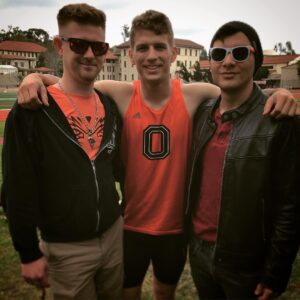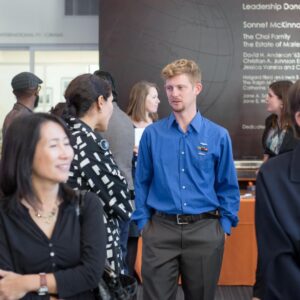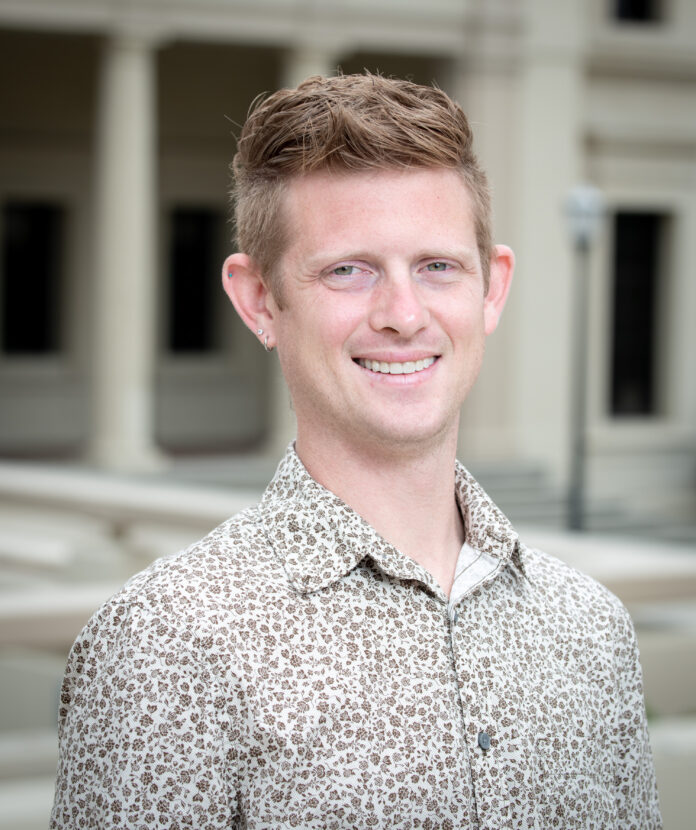Between his doctorate program at UCLA and his job as director of Veteran’s Programs at Occidental, the hour-long commute between school and home is some of the only time that Daryl Barker* ‘17 has free.
Barker, who started his first year at Occidental in 2014 about six weeks after the end of his six years of service in the Navy, returned to Occidental in 2020 as director of Veteran’s Programs. Barker said he was working at the Occidental Library when Nathan Graeser, the former head of Veteran’s Programs, went on sabbatical, and Barker stepped up into the position that summer.
Coby Constantino (senior), who said he is one of four student veterans currently enrolled at Occidental, noticed from the beginning how generous Barker was with his time. In one of their first interactions when Constantino needed help with veterans’ benefits, he was surprised to receive a call right then and there when he reached out to Barker about it, he said.
“And he did that while commuting back. Because I know that’s one of the few periods of time that he has available,” Constantino said. “His commute, no matter how you look, it is complete hell, because he’s traveling from the Westside. There’s really no freeway access there. You’re in, like, bumper-to-bumper traffic, and you’re driving all the way here. And he works. I don’t know how he finds the time.”
Constantino said that being present like Barker is an increasingly rare trait, what with the busy lives many lead today.
“That’s the type of person you needed in this position,” Constantino said. “That’s just one small example, but I mean, you don’t need a grand example to show someone’s present. It’s really [in] the small details that you can tell if someone really does care.”
Emily Jo Wharry* ‘20 was a photo editor alongside Barker at The Occidental, though she said the dynamic felt more like a mentorship.
“At the time, I was very timid, I was very nervous. And I feel like Daryl took me under his wing, and really showed me what it looks like to work hard at your craft, to care about other people, to live your values in your day-to-day life,” Wharry said.
Wharry said she was inspired by Barker’s willingness to spend his time helping younger students develop their skills. Wharry said Barker mentored not only her but every photographer on the staff, taking time every week to talk with them one-on-one, go through their shots and give them pointers and encouragement.
“I don’t think a lot of people want to dedicate that amount of time to something as meticulous as training an 18-year-old on how to take good camera shots. But he did it,” Wharry said. “He didn’t suffer fools, if that makes sense. He was simultaneously a very caring mentor, and a very tough editor.”
Barker said that the transition to college is especially hard for veterans and non-traditional students. During the first week of his first semester, Barker said, he was assigned “Can the Subaltern Speak?”, decolonial theory written by Gayatri Spivak. It took him three hours to read 10 pages of the dense text, looking up every other word. Barker said he was lucky to have someone who shared his experience only a phone call away: his mom, who had also been a non-traditional student, returned to school in her late 30s.
“Most people don’t have that person,” Barker said. “If that was the only thing that kept me in college that day or that week, I think other people should still have the opportunity to be successful, even if they don’t have my mom to talk them through.”
Barker said that when he first visited the school for an interview at 17, he had an immediate sense that he would be an Occidental student.
“I was walking between the Cooler and the JSC, and I saw a group of kids who were sitting on the grass. And there were two of them reading, one was reading a book, one was reading a paper. And then the other two were playing Frisbee, I think. And I just had this overwhelming feeling: I was like, ‘I am going to be one of them, I just know it,'” Barker said. “I can’t explain it. I was like, ‘I know this is where I’m supposed to be.’ So it took me seven years to actualize that, but I did.”
Occidental was his dream school, but he did not get in when he applied in high school, Barker said. He did not have a clear path forward after high school, and said he lacked discipline.
“I was kind of just a mess, I would say,” Barker said.”I went to a recruiting office, and they told me they would teach me how to operate a nuclear reactor on a submarine. And I thought that sounded pretty cool. So I said yes.”
Barker had been exposed to the idea of military service since he was a child, when his great-granduncle used to send him medals, earned in the Army Air Corps during World War II, on his birthday.
Barker became the fourth generation in his family to serve in the military. After a year and a half of training, Barker served aboard the USS Tennessee submarine, part of the strategic nuclear deterrence force. After six years of service, Barker applied to Occidental again, after hearing about the Ahmanson Foundation Veteran Initiative.
“I came back from deployment and got my acceptance letter. I got out of the Navy, and about six weeks later I was at O-Week,” Barker said. “Which, if you want to talk about culture shock, going from deployment on a submarine to orientation at a liberal arts college? Very jarring.”

Barker said that during orientation he often felt he was too old for many activities, which did not seem aimed at people with his life experience or age. Still, Barker ended up attending all the events, and became quite involved on campus.
Besides being involved in his major department, politics, Barker was involved with veteran’s programs, did a Campaign Semester in Florida, worked as a photographer and then photo editor at The Occidental and was a part of the Oxy Democrats club.
Barker also helped to re-start the Queer Student Alliance, and served on the e-board. Barker said he enlisted during “Don’t Ask, Don’t Tell,” and had to go back in the closet in order to join. Barker lived at Queer House while at Occidental, and said that inhabiting a space that was explicitly and demonstrably queer was a liberating experience, coming from a place that was hostile, at best, to queerness.
Constantino noted that veterans are some of the only students whose life paths have not been continuously aimed at academia.
“For most students here, it’s like high school and then college. So there’s really not much opportunities there to expand your worldly experiences,” Constantino said. “So the veterans, since we’re not too tied too much to academia, we come in with those different perspectives, and are able to kind of temper the theoretical perspectives of professors and students on campus.”
Barker also said that students would frequently throw around terms like “feeling unsafe,” and his own experiences — situations where he could have died — gave him pause to reflect on what safety meant to other students with different life experiences. On the other hand, Barker said, his experience also gave him a chance to recognize the importance of student activism that some might dismiss.
“I’m here to tell you, this is real life still — just because you’re in college doesn’t mean it’s not real,” Barker said.

Barker said the ways students talked about foreign policy made it clear that they were not thinking about who has to carry out the country’s actions; he said he would seek out classes where he felt a military perspective would be unwelcome.
Barker recalled a heated class discussion about G4S, a company that does defense contracting around the world, and has been involved in surveillance in Israel in the occupied West Bank.
“I just shared, I was like, ‘I have two friends who work for G4S, they’re people who go to work like it’s a regular job. And they do a pretty normal technical job. They’re not demons,'” Barker said. “And everyone looked at me like I had horns growing out of my head, a little bit. But for me, it wasn’t an abstraction, right? Like, I can picture the person they’re talking about when they’re saying these things.”
Barker said that one perspective doesn’t invalidate another.
“But when you’re sitting down, and you’re looking at the person across a table or across a classroom, their humaneness is evident,” Barker said. “And it’s much harder to dismiss when there’s someone literally right in front of you saying the thing that is the polar opposite of what you believe to be true and right.”
Barker said he was shaped by these classes and conversations, and would not have been the same without them. He said he was unsure that the conversations had the same effects on other students, but would hope that it gave his peers a look into the lived experience of veterans, and a chance to consider the who serves in the military and why.
Barker referred to the idea of “warfare welfare” — that the country has reduced its public services and social safety net, and many join the military explicitly to gain access to benefits.
“When you combine that with the kind of systemic shrinking of the warrior class, it creates this really problematic dynamic where it’s like, ‘Who are the people that are actually asked to pay the price to do the things that we need to do to maintain our way of life?'” Barker said. “Or at least [what] our leaders perceive we need to do.”
Wharry, who also majored in politics, said having Barker in her classes tethered discussions to the facts of the matter, and that his intentionality was obvious in class.
“I think it’s so easy to be passive about the world-class education that you experienced at Occidental, because it’s just your day-to-day life — you normalize it,” Wharry said. “Something that I’ve noticed with older students is that they were really valuing the education in real time as it happened.”
According to Barker, life after the military leads to an inevitable “why am I doing this?”

“When you’re in the military, you wake up every day, someone else is telling you where and when to be there, they’re telling [you] what the mission is, and whether you’re succeeding or not doing the mission. And they can articulate in like one or two sentences, what your job is, what your mission is, and what your purpose is,” Barker said. “When you get out and you go to college, and someone’s telling you, ‘You can take whatever class you want, you can do whatever, you know, you can get any degree you want, you don’t have to be anywhere at a specific time,’ it’s freeing, but it’s also disorienting.”
Barker said that though the veteran community at Occidental is small, the support can be essential for those transitioning from military to civilian life. By the time he left the service he had mixed feelings about it — fundamentally opposing the use, and even existence, of nuclear weapons — but leaving behind the structure of the military felt like a step back into uncertainty.
When a Strong Interest Inventory test Barker took in the Navy showed a significant overlap with library science, he initially brushed the idea off — though he had loved the library as a kid, as a nuclear submarine operator it did not seem like an obvious career path. Still, the seed had been planted, and began to germinate during his time in college, Barker said. After graduating he earned his master’s in Library Science, eventually bringing him back to Occidental.
Barker found his academic niche researching the ways veterans and other non-traditional students falling through the institutional cracks can be supported by library services. He said that at Occidental — a small school with a small veteran’s program — support comes in the form of close personal connection with the few other veterans. Barker’s experience allowed him to connect directly with veterans at Occidental. Thirteen years after he visited and initially sensed his place at the school, Barker has found his place to remain in the Occidental community.
“When I got out, it was like that aimless feeling that got me into the Navy in the first place came back, where it was like, ‘Oh, I have to make the purpose myself,’” Barker said. “A lot of the experience for me at Oxy was about ‘I have to find my own way and make it as meaningful as that experience.'”
*Daryl Barker ’17 was a Photo editor for The Occidental.
*Emily Jo Wharry ’20 was editor-in-chief of The Occidental.
![]()































